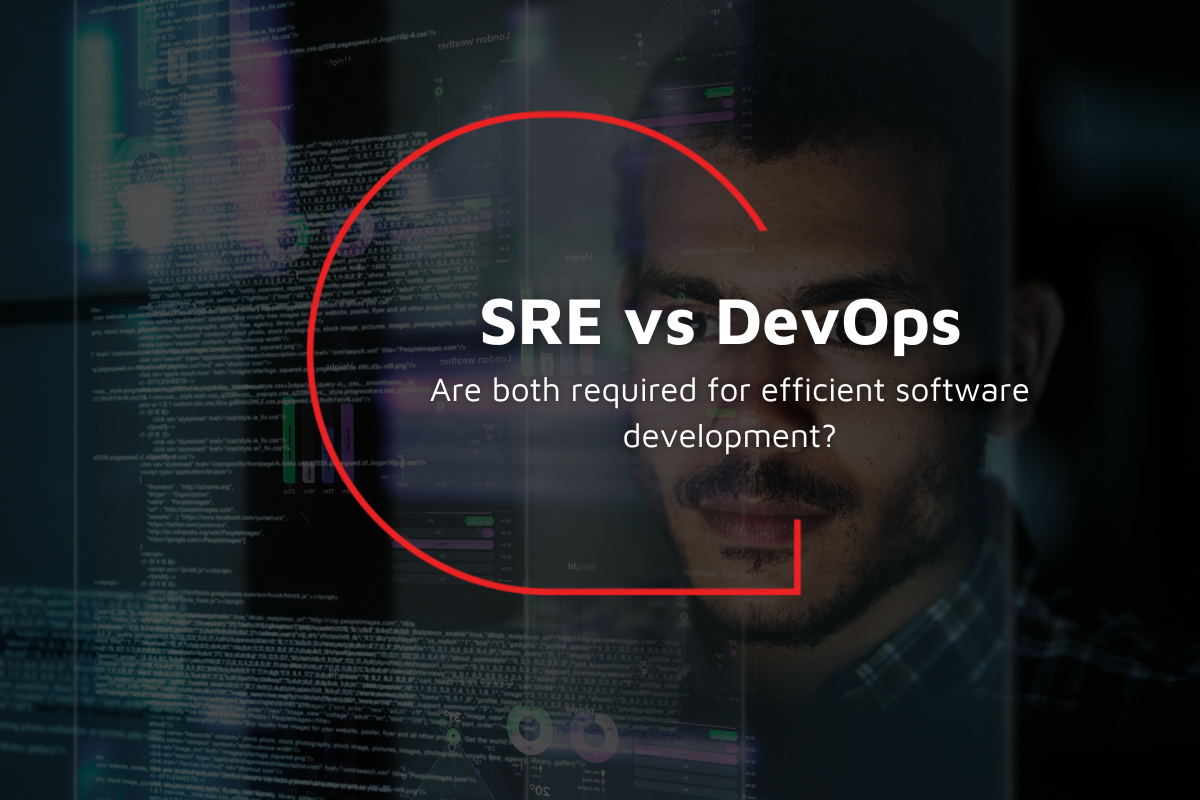SRE vs DevOps – are both required for efficient software development?
16 February 2023 | Noor Khan

In order to streamline software development and improve the performance of software applications, software engineers often spend a significant amount of time searching for monitoring and maintenance applications. This has led to the development of two popular methodologies – (Site Reliability Engineering) SRE Vs DevOps.
Both methods are useful for software development services, but the way they work, the functional application of the processes, and the technologies used can be different; there are pros and cons to both processes and these need to be considered in order to make an informed choice.
Benefits and limitations of SRE
SRE is a process that requires continuous daily operation of applications in development and aims to bridge the gap between Operations and Development teams. The process focuses on the end-user and aims to ensure that a program is reliable, stable, and functional to the highest degree.
Benefits of SRE
Software benefits from improved efficiency
Because SRE operates with straightforward upgrade processes, there is increased efficiency and a reduction in instances of software failure.
Improved troubleshooting and error detection
With constant monitoring and communication, errors and potential errors can be detected at the earliest opportunity, allowing teams to develop and implement solutions before the issues become critical or delay the software development.
Efficient and Cost-effective practices
The techniques utilised in an SRE approach seek to minimise the time and resources being used to eliminate feature failures or unforeseen errors. This translates into increased availability for team members, reduced distribution system costs (due to failures requiring more spare parts), and a reduction in time wastage.
Maximised output with minimal operating expenses
Utilising predictive and preventative maintenance programs, one area of focus for SRE is the reduction of downtime and the maximisation of output. This leads to a minimisation of operating expenses, as a result of the software functioning as intended, and not requiring excessive downtime or periods of unavailability.
Limitations and challenges of SRE
Limited industrial information
SRE is a unique discipline and one that is still considered to be fairly new. The amount of industrial information available is limited, and this can make it difficult to manage an SRE team who are new to the discipline or unfamiliar with the complexities of the methodology.
Communication and management must be a consistent and high level
The practices involved in SRE are different to many team structures, and managers are required to adopt practices that may seem unorthodox. Communication channels must be robust and reliable, so that team members can communicate, escalate, or address identified issues without delay.
Sourcing reliable SRE teams
Because of the variety of skills and knowledge required for an SRE approach, there is a high standard set for hiring Site Reliability Engineers. It may be difficult to source an SRE team within the company and may require the employment of operational monitoring and support from a third party.
Benefits and limitations of DevOps
DevOps is a framework that focuses on collaboration between development and operations, it encourages the implementation of intentional processes that are designed to gain returns, and measures the effects of these adjustments, as well as the social and cultural adjustments of the work environment of the team.
Benefits of DevOps
Aligns business goals with technology
Processes are focused on shortening feedback loops, delivering according to development briefs, and achieving continuous improvement. This helps to ensure that up-to-date methodologies and technologies are smoothly integrated into the software development process and align technology with operations.
Speeds up business performance
As processes become more streamlined and effective, time wastage is reduced, and engineers can spend their valuable time on delivering innovation.
Encourages digital transformation
As DevOps embraces technology at its very core, the process develops the user experience and improves team productivity, whilst integrating digital transformation into the foundation of the business.
Improves the work culture whilst upgrading the user experience
Unlike other methods that only focus on the application of technology, DevOps also looks at the social and cultural impact of the work. By improving the environment of the team there is less likelihood of resistance to the methods, and more focus on development.
Limitations and challenges of DevOps
Benefits may be realised over a long period of time
As DevOps requires a substantial change to not only the way in which people work, but the environment in which they are working, the process can take quite a while to develop, imbed, and implement. This requires patience and a commitment to seeing the process through.
May be difficult to implement
Change does not always come easily, and if a company is facing a substantial number of challenges, both with the development projects and with the teams behind them, then DevOps may not be a good choice. The process requires a team that is familiar with working together and are open to the profound cultural changes raised.
Requires extensive change to many working environments
Setting up the technologies and processes to manage DevOps requires a strict structural approach, and a commitment from the team to utilise the tools. This can prove challenging for teams who are used to working more independently, or who make use of hybrid or remote working.
SRE vs DevOps - Key differences
SRE Vs DevOps are both processes that require a change in team style to implement, and the application of the methodologies may be a matter of preference or necessity, depending on the needs of your project.
In order to make an informed decision, the key differences between the two need to be compared.
| Key Factor | SRE | DevOps |
| Core Focus | Operations | Product Development |
| Approach | Production environment as an available service | Streamlining processes and reducing risk |
| Usage | Build, run, monitor, and improve systems | Applied for Agile development projects |
| Goals | Create systems that can be maintained by a small number of skilled engineers | Improve communications between groups and increase efficient working |
| Works for | Teams concentrating on operations | Teams concentrating on product development |
Both SRE Vs DevOps are methodologies that play important roles for companies developing their digital infrastructure, and as they continue to be adopted and adapted by industries across the globe, their use will only continue to grow.
Ardent software development
The Ardent software development team has been delivering excellence for over 15 years. Working with a bespoke approach, we take on board our client's requirements to deliver a solution that fulfils that. Whether you require need future proof software delivered to bring your vision to life or require SRE on an ongoing basis. Explore how our customers are succeeding with ongoing operational monitoring and support:
- Working as a cohesive unit to evolve and improve software for over a decade
- Ensuring data availability and accessibility to avoid data lags and dropouts for a leading market research organisation
Ardent Insights

Are you ready to take the lead in driving digital transformation?
Digital transformation is the process of modernizing and digitating business processes with technology that can offer a plethora of benefits including reducing long-term costs, improving productivity and streamlining processes. Despite the benefits, research by McKinsey & Company has found that around 70% of digital transformation projects fail, largely down to employee resistance. If you are [...]
Read More... from SRE vs DevOps – are both required for efficient software development?

Stateful VS Stateless – What’s right for your application?
Protocols and guidelines are at the heart of data engineering and application development, and the data which is sent using network protocols is broadly divided into stateful vs stateless structures – these rules govern how the data has been formatted, how it sent, and how it is received by other devices (such as endpoints, routers, [...]
Read More... from SRE vs DevOps – are both required for efficient software development?

Getting data observability done right – Is Monte Carlo the tool for you?
Data observability is all about the ability to understand, diagnose, and manage the health of your data across multiple tools and throughout the entire lifecycle of the data. Ensuring that you have the right operational monitoring and support to provide 24/7 peace of mind is critical to building and growing your company. [...]
Read More... from SRE vs DevOps – are both required for efficient software development?






